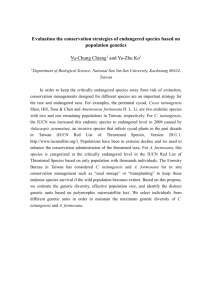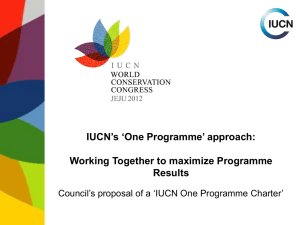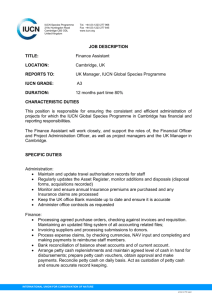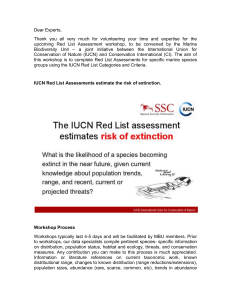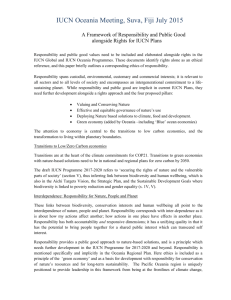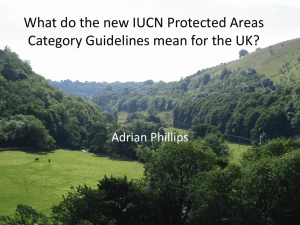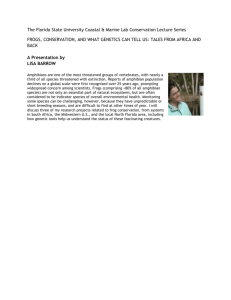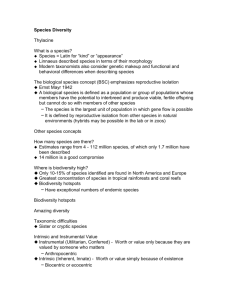Venerable conservation organization predicts how climate
advertisement
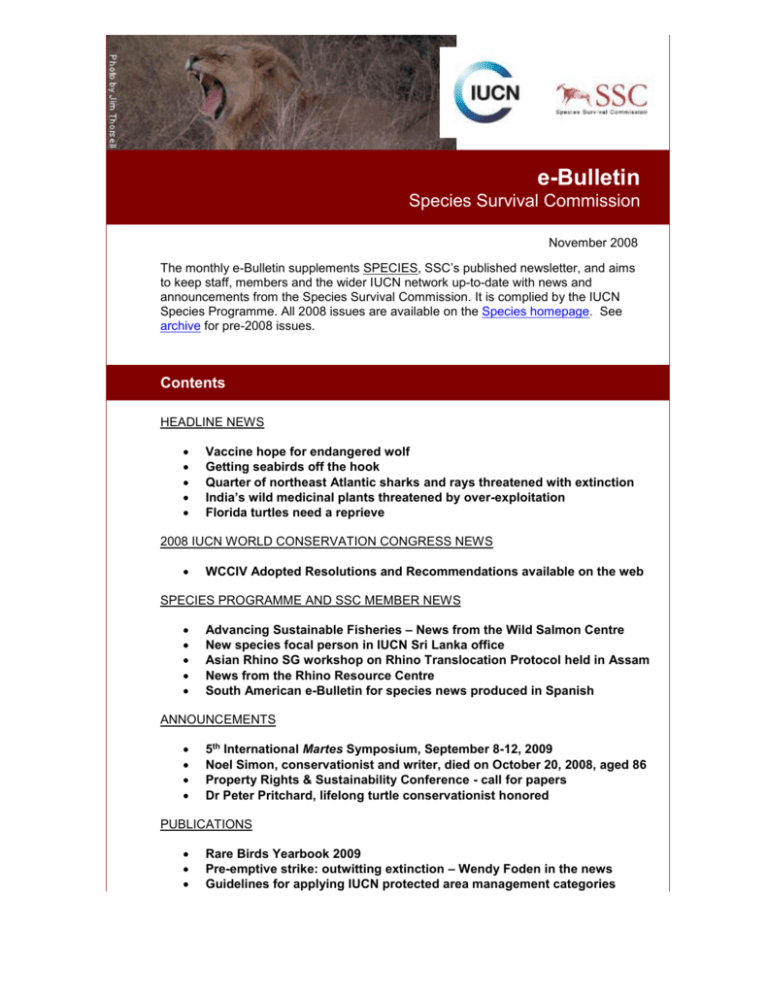
e-Bulletin Species Survival Commission November 2008 The monthly e-Bulletin supplements SPECIES, SSC’s published newsletter, and aims to keep staff, members and the wider IUCN network up-to-date with news and announcements from the Species Survival Commission. It is complied by the IUCN Species Programme. All 2008 issues are available on the Species homepage. See archive for pre-2008 issues. Contents HEADLINE NEWS Vaccine hope for endangered wolf Getting seabirds off the hook Quarter of northeast Atlantic sharks and rays threatened with extinction India’s wild medicinal plants threatened by over-exploitation Florida turtles need a reprieve 2008 IUCN WORLD CONSERVATION CONGRESS NEWS WCCIV Adopted Resolutions and Recommendations available on the web SPECIES PROGRAMME AND SSC MEMBER NEWS Advancing Sustainable Fisheries – News from the Wild Salmon Centre New species focal person in IUCN Sri Lanka office Asian Rhino SG workshop on Rhino Translocation Protocol held in Assam News from the Rhino Resource Centre South American e-Bulletin for species news produced in Spanish ANNOUNCEMENTS 5th International Martes Symposium, September 8-12, 2009 Noel Simon, conservationist and writer, died on October 20, 2008, aged 86 Property Rights & Sustainability Conference - call for papers Dr Peter Pritchard, lifelong turtle conservationist honored PUBLICATIONS Rare Birds Yearbook 2009 Pre-emptive strike: outwitting extinction – Wendy Foden in the news Guidelines for applying IUCN protected area management categories New SSC Handbook on Strategic Planning for Species Conservation Headline News Vaccine hope for endangered wolf With fewer than 500 left, the endangered Ethiopian wolf teeters on the brink of extinction. In their stronghold in the Bale Mountains National Park wolves live in close contact with the Oromo people. Whilst this coexistence is encouraging, it places the wolves at great risk of catching the rabies virus from the dogs the Oromo use to herd livestock. The Ethiopian Wolf Conservation Programme (EWCP), led by Dr Claudio Sillero, chair of the SSC Canid Specialist Group, is hard at work in a race to to save the world’s rarest wolf from rabies by creating a ‘barrier’ of vaccinated wolf packs. The species Ethiopian Wolf (Canis simensis), is classified as Endangered on The IUCN Red List of Threatened Species™. Details here Getting seabirds off the hook The Hawaiian longline tuna fishery has managed to reduce seabird bycatch by 67% since 2001 by making alterations to their fishing gear and methods, a new scientific study shows. A combination of new bait technologies and fishing techniques have dramatically reduced seabird bycatch. More birdlife could be saved, however, if the rules were applied in a larger area and fishing effort reduced in certain seasons. Read more here Quarter of northeast Atlantic sharks and rays threatened with extinction The release of the first ever IUCN Red List of Threatened Species™ assessment of northeast Atlantic sharks, rays and chimaeras reveals that 26 percent are threatened with extinction and another 20 percent are in the Near Threatened category. The total number of threatened species may well be higher as there was insufficient information to assess more than a quarter (27 percent) of the species. The report, released by the IUCN Shark Specialist Group (SSG), reveals that shark, ray and chimaera species are much more threatened in the northeast Atlantic than they are globally. Specifically, seven percent of species in the northeast Atlantic are classified as Critically Endangered, seven percent as Endangered, and 12 percent as Vulnerable, primarily due to overfishing. This means 26 percent are threatened in the northeast Atlantic, compared with 18 percent globally. Full report India’s wild medicinal plants threatened by over-exploitation India is a hub of the wild-collected plant medicine industry in Asia, but key species have declined due to over-collection to supply domestic and foreign medicinal markets, according to IUCN and TRAFFIC researchers. The report focuses on seven plant species of conservation concern protected under the Convention on International Trade in Endangered Species of Wild Fauna and Flora (CITES). “The importance of these long-traded plant species to local livelihoods cannot be over-emphasized,” says Danna J. Leaman, Chair of IUCN’s Medicinal Plant Specialist Group. “But we need the best possible information about the extent of regional and global trade to ensure sustainable supplies can continue to support family incomes long into the future. Read more here Florida turtles need a reprieve Several of the world’s leading turtle scientists have called on the Governor of Florida to end the commercial hunting of turtles which supplies eastern Asia. The experts, brought together by the Tortoise and Freshwater Turtle Specialist Group made their plea in a letter to Governor Charlie Crist. “Florida’s freshwater turtles are being harvested at an unsustainable rate to supply East Asian food and medicinal markets,” the letter said. “New rules recently implemented by the Florida Fish and Wildlife Conservation Commission (FWC) do not resolve this issue.” On September 17, 2008, the FWC had voted to allow commercial fishermen to catch 20 softshell turtles a day. “Although this was an improvement, as previously there were no catch limits, the limit is still too high,” says Anders Rhodin, Chair of IUCN’s Tortoise and Freshwater Turtle Specialist Group. Read more here 2008 World Conservation Congress News All the draft texts of the Barcelona resolutions and recommendations, in English, have been posted on the IUCN website here. The final texts in the three IUCN languages will be posted online in early 2009. Species Programme and SSC Member News Advancing Sustainable Fisheries On November 12-13, 2008, the Wild Salmon Center organized and hosted the second annual Sustainable Fisheries coordination meeting with NGO and private sector partners, including World Wildlife Fund, Pacific Environment, and the Sustainable Fisheries Partnership, amongst others. The purpose of this meeting was to identify and prioritize key barriers to sustainable salmon fisheries in the Russian Far East (RFE) and develop common strategies to address them. The meeting's participants discussed current sustainable fishery projects across the RFE, including Marine Stewardship Council (MSC) assessments and major seafood buyer's work for Russian salmon. Barriers to sustainable fisheries in the RFE, such as Illegal, Unreported, and Unregulated (IUU) fisheries, administrative barriers, and hatchery impacts, were described and prioritized strategies developed. More here New species focal person in IUCN Sri Lanka office: Dr Devaka Weerakoon joins the Ecosystem & Livelihoods Group Asia in Colomba Dr Weerakoon is a conservation biologist and has over 20 years of experience in the field of species and biodiversity. He has worked on the ecology of the Asian elephant and Human Elephant Conflict for nearly a decade. He has played an active role in the RedListing process of Sri Lanka where he led the team that compiled the 2001 IUCN list of threatened fauna of Sri Lanka. He was also a technical consultant for the 2007 RedList. He has assisted the Biodiversity Secretariat to prepare recovery plans for selected threatened species and develop a database on fauna and flora. He has extensive experience in preparation and implementation of Protected Area Management plans, managing alien invasive species, habitat mapping, protected area gap analysis, and conducting biodiversity baseline surveys. Devaka has work experience in the USA and Sri Lanka. Contact him at dkw@iucnsl.org Asian Rhino SG workshop on Rhino Translocation Protocol Guwahati, 12th November 2008: a one day workshop on the Rhino Translocation Protocol took place at the College of Veterinary Science of Assam Agricultural University and was attended by some 17 veterinarians from all over Assam. Presentations were given by experts from the College, Dr Bibhab Kumar Talukdar, co-chair of the Asian Rhino Specialist Group as well as Dr. Richard Kock, Chair of the Wildlife Health Specialist Group. The workshop aimed to provide a forum for experts to exchange knowledge and experience and to develop an improved approach to rhino capture and translocation practices in India. Dr. Kock of the Zoological Society of London praised the efforts being made by the veterinarians in Assam to improve practices and shared his experiences in rhino and other wildlife translocation elsewhere in the world. The SSC Guidelines For Reintroduction and Translocation of African and Asian Rhino for in-situ Conservation Purposes are in preparation and will be published shortly. View photo News from the Rhino Resource Centre The 13th issue of the quarterly e-newsletter of the Rhino Resource Centre (RRC) is now available. Edited by Dr Kees Rookmaaker it includes information on forthcoming meetings and calls for proposals relating to rhino conservation. Newsletter South American e-Bulletin for species news produced (in Spanish) This news bulletin produced by the IUCN South America Regional Office Species Unit in Quito is available here. Announcements 5th International Martes Symposium The Martes Working Group is pleased to announce that the 5th International Martes Symposium will be held at the University of Washington in Seattle during the week of September 8-12, 2009. The theme of this symposium will be “Biology and Management of Martens and Fishers: a New Synthesis”. One of the objectives of this gathering will be to update review or synthesis topics that were featured at the 1st Martes Symposium in 1994, and in subsequent meetings. Topics covered previously include evolutionary history, phylogenetic relationships, distribution and status, population structure and spacing, remote detection and population monitoring, reproductive biology, habitat ecology, food habits, and translocations. Recent developments in our field will likely necessitate additional review chapters on the use of genetic data in Martes research and conservation, relations with snow, potential effects of global warming, and others. More details and call for abstracts available here. Noel Simon We are all saddened to hear of the death of Noel Simon in October. Noel Simon founded the Kenya Wildlife Society which went on to become the East African Wild Life Society. Working for IUCN in the 1960’s he played a major role in starting the IUCN RedList. He left IUCN in 1969 after the publication of "Mammalia", which was the first volume of the Red Data Books. The basic idea for the series of Red Data Books had been Sir Peter Scott’s, but Simon was given a free hand to compile the first volume, with full discretion in devising the system, deciding the content and format, as well as the species warranting listing. Except for a part-time secretary, he worked on his own, single-handedly undertaking the huge amount of research and worldwide correspondence involved in gathering the data on which all else depended. Read Noel Simon’s obituary from The Times. Property Rights & Sustainability Conference - call for papers The University of Auckland Faculty of Law and the New Zealand Centre for Environmental Law will host a conference on property rights and sustainability 16-18 April 2009 in Auckland. The conference will bring together leading academics, judges, government officials, policy analysts and practitioners to examine the future of property rights within the context of sustainable development. The conference will open with a public address from Judge Christopher Weeramantry (former Vice President of the International Court of Justice) and will feature presentations from a number of prominent scholars and commentators on property rights, sustainability, the environment and resource management. For more information, including a description of key conference topics, visit www.nzcel-conf.auckland.ac.nz Dr. Peter Pritchard, lifelong turtle conservationist honored The third annual Behler Award for freshwater turtle conservation has been presented to Dr. Peter Pritchard, at a joint symposium of the Turtle Survival Alliance (TSA), and the IUCN / SSC Tortoise and Freshwater Turtle Specialist Group (TFTSG). Dr. Pritchard received the award for his inspirational leadership and huge commitment to the conservation of turtles and tortoises. Having written several important texts on the subject he also founded the Chelonian Research Institute, which houses the world’s largest collection of turtle specimens at around 13,000 exhibits. His influence has led to three types of turtle being named after him and Time Magazine hailing him a ‘Hero of the Planet’. The award was announced at the 6th Annual Symposium on Conservation and Biology of Freshwater Turtles and Tortoises in September at Tuscon, Arizona. It was presented by the Chair of the IUCN/SSC TFTSG, Anders Rhodin, and Co-Chair of the TSA, Rick Hudson. Publications Rare Birds Yearbook 2009 launched Erik Hirschfeld, author of the Rare Birds Yearbook visited IUCN HQ recently. Staff were impressed with the resourcefulness, energy and enthusiasm required to produce this impressive book himself. It is a field-guide like reference book of the 190 Critically Endangered bird species in the world and includes stunning photos, distribution maps and feature stories. Click here for details of this fascinating publication – a must have for all bird enthusiasts. Buy the book online here and Erik donates £4 to Birdlife for every copy purchased. Pre-emptive strike: outwitting extinction Venerable conservation organization predicts how climate change will affect individual species. Will conservationists take pre-emptive action? Read an article appearing in Nature Reports Climate Change featuring the Red List and the work of Wendy Foden here Guidelines for applying IUCN protected area management categories IUCN is not only famous for its Red List Categories, but also for its Protected Area Categories. The World Commission on Protected Areas, custodian of the protected area categories has recently produced new guidelines which are now available. These new guidelines contain a new protected area definition, which focuses more on nature conservation and management effectiveness: Categories are generally the same, albeit with more explanatory text and sections on different biomes and governance types, but category IV, habitat/species management area, is broadened from somewhere needing management intervention to a place that “protects particular species or habitats and management…” The full guidelines are available here New SSC Handbook on strategic planning for species conservation The Species Conservation Planning Task Force chaired by Robert Lacy (Conservation Breeding SG) has published a handbook to provide guidance to Specialist Groups on how and when to prepare and promote Species Conservation Strategies (SCSs). The handbook includes advice on how to: conduct a thorough status review of a species or species group develop, through broad consultation with stakeholders, vision and goals for the conservation of a species or species group set objectives for achieving the vision and goals address those objectives through geographically and thematically specific actions The Handbook describes recommended methods for creating successful SCSs, brief case studies or examples of aspects of SCSs, and references to sources of additional help and guidance. Download the handbook here (123 pages, 7MB) A much shortened version has been produced as an overview – download this overview here. (34 pages, 3MB) These documents can also be found on the IUCN website by searching the publications database under Resources For more information or if you wish to submit an item please contact Claire Santer –SSC Membership and Administrative Assistant, Species Programme. claire.santer@iucn.org
